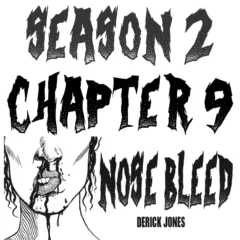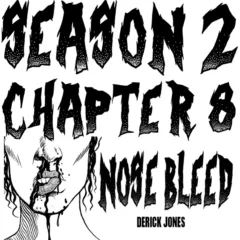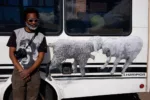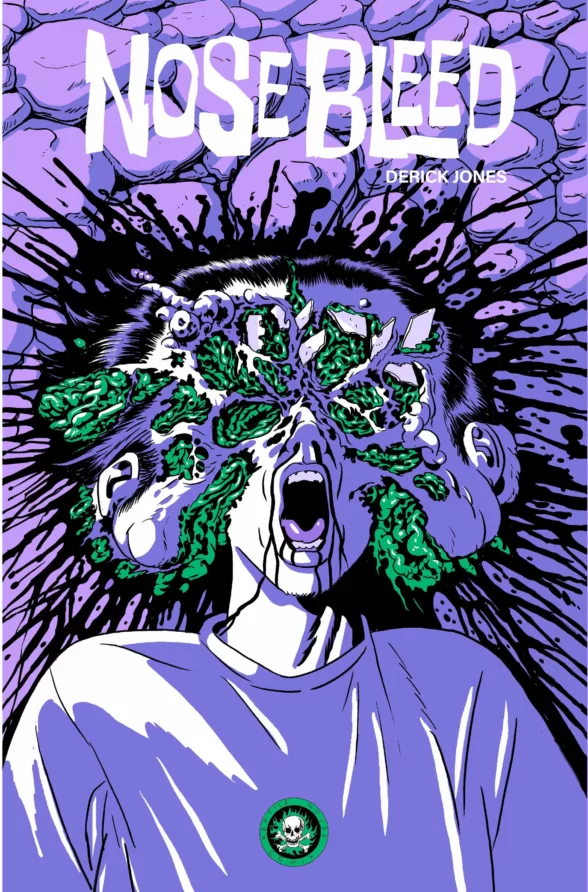
Derick Jones started out doing music and so when he moved from Florida to Bucks County, in 2011, he was making music. But the artist – who’s never taken an art class but has been filling sketchbooks since he was a kid – started making comics at the same time. In 2014, he moved to Philadelphia. He saw the comics scene exploding, with artists moving in from all over the country for the cheap rents and the big art community, and he jumped right in.
“I moved here when I was 24. I’m from the suburbs, so I felt like a little kid moving to the big city and being mesmerized and terrified at the same time. I always tell people, Philly’s the place where I learned how to pay bills, get my own apartment, you know, become an adult, basically.”
He didn’t know anyone when he moved here. “I just felt so alone. But I started to make myself go on walks and then on those walks I started taking pictures.”
The pictures became the basis for drawings. And he said he’s still looking up in wonder like a little kid. “I want those pieces (the drawings) to have that sense of a child walking through the city for the first time. Kids are always looking up and looking at all the tall stuff around them. I try to invoke that.”
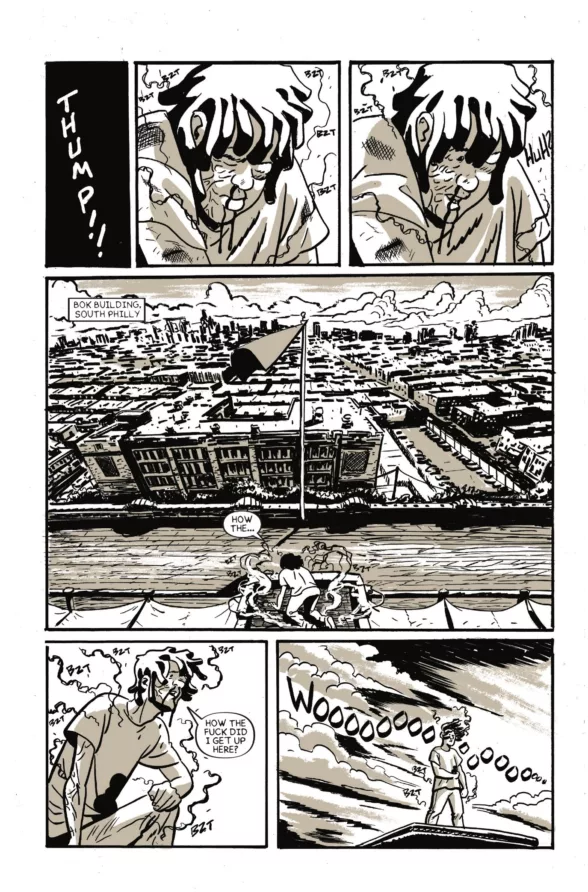
His comic, Nose Bleed, which is in its second year on Artblog, is about teenagers with telekinetic powers who have been bullied and seek revenge. There’s a virus that infects people and a lot of exploding body parts (remember, telekinetic powers) and fighting (bullies). The comic is set in Philly, with a decided street sensibility. Comics usually take place in cities, but unlike the tall buildings of Gotham City, Philly is depicted in gritty details with narrow, cyclone-fenced alleyways, looming shots of the Spring Garden Street bridge over the Schuylkill, a scene from the Bok building roof overlooking the miles of flat-roofed rowhouses of South Philly and lots of overhead wires that are the background of many of the scenes. The “sound effects” are fanciful. In the Nose Bleed universe, “Pow” “Pop” and “Thud” are not enough. Instead, we have “Hurk” “Bwip” “Crtch” “Thwip.”
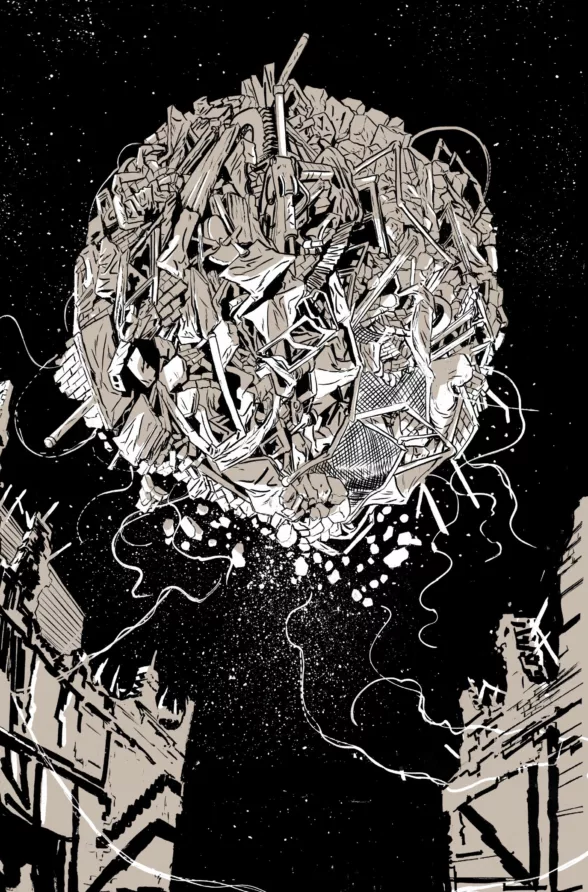
I asked Derick if the comic, which debuted in April 2023, was sparked by Covid, a virus that had a lot of people infected who might have felt their bodies changing in ways that felt like explosions.
“Dunno. Yeah. Maybe. I honestly didn’t even put that together. So, Nose Bleed came about as a story that’s always been in my head. I love the psychic telekinetic genre, like what Stephen King and Kamo have done, kids getting psychic abilities and then going nuts and getting revenge on their bullies. Dealing with bullies and racism without hammering people on the head with it has been a really big goal with Nose Bleed and just talking about things that people experience without having to be so heavy handed with it.”
Derick’s passion is his comics but he’s not making a living at it yet. So, he works on commissions. “The last two years have been rough. I’ve had to really pivot and find gigs more and more. And I picked up a part-time job, doing graphic design work and, you know, you just have to keep the plates spinning basically.”
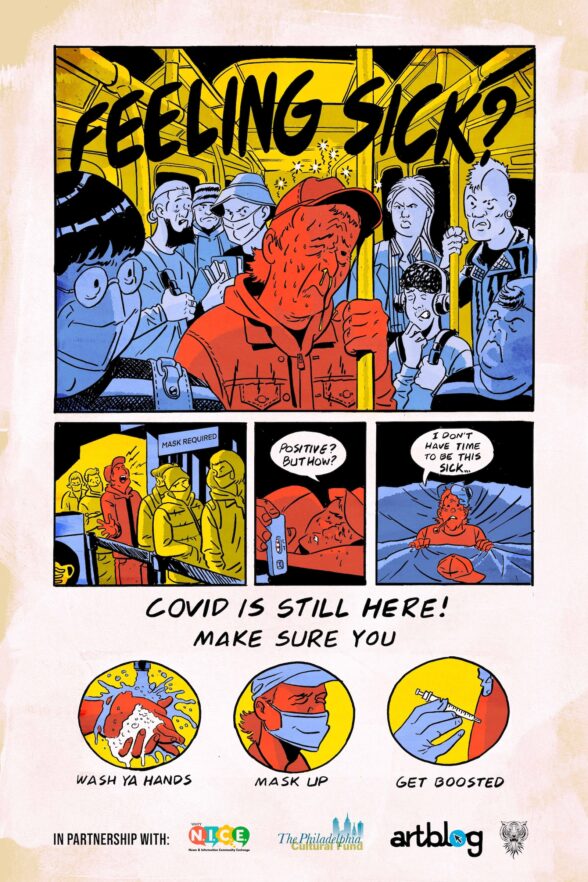
Artblog commissioned Derick to make a Covid Awareness poster for the WHYY “Boost Truth” initiative that we are a part of. He was happy to get the gig. And so were we. He’s a good storyteller and we knew he could come up with a comics approach that was in keeping with his art but also fulfilled the need to tell a public service announcement.
The poster does tell a story and includes a PSA. In Nose Bleed bullies beat up on teens and those teens get revenge and I asked whether Covid is the bully in the poster story, beating up on the main character in the comic who doesn’t mask up or take precautions and gets sick.
“We all have our own opinions on Covid and it can get annoying. I know it’s annoying, but also I think, ‘Hey man, if you see a bunch of people wearing a mask, maybe that means you should put a mask on.’ You know, just social cues. So I really wanted to throw all that into that poster, but once again, without being heavy handed. I want it to be strictly visual. Anybody can look at the poster and tell that this guy’s not following protocol, and then he has to pay for it, unfortunately. He gets sick.”
Derick Jones is a Philly transplant currently living and working out of Chicago. He’s drawn comics for Z2 (yungblud and the ritalin club vol 1 and 2) and Boom! Studios (Plunder). He is currently writing and drawing creator owned books while maintaining an insane diet of coffee and mountain dew energy drinks. Instagram @skudsink derickjonesart.com
Excerpts from our interview with Derick Jones, edited for clarity and length
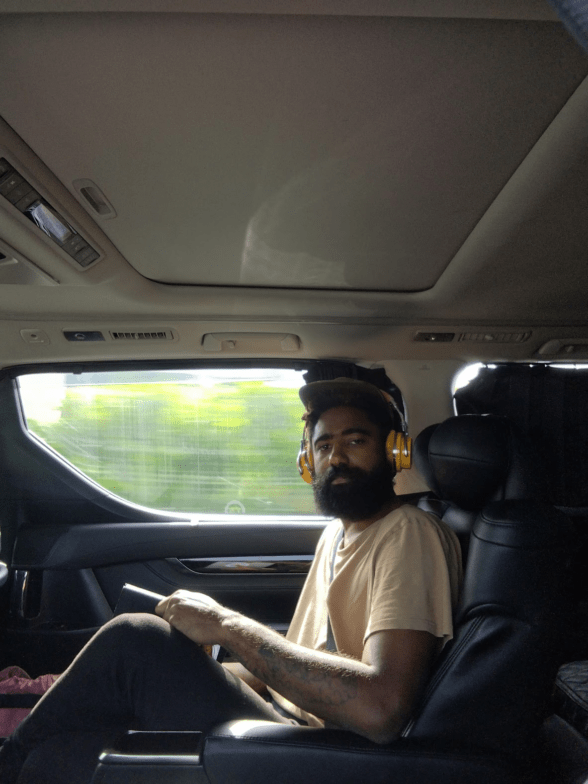
ABOUT THE PHILLY COMICS SCENE
Derick: Probably 2012 to 2013, the comic scene in Philly was really kind of big. A lot of people were coming here from New York and it was just kind of blossoming. At that time it was still pretty cheap to live in Philly, so there were still warehouses and all these studios and it just seemed such a cool place. And of course when I got there, it kind of died out ’cause everybody started getting priced out, but I stuck around.
Roberta: oh no!
Derick: Yeah
Roberta: Isn’t there a second bump happening now (2023-24)? I mean, Partners and Son is here, and I think they’ve drawn a few people in.
Derick: Yeah, that’s what I was going to say. Right now there’s a second boom mostly because of Partners and Son and Reptile House Comics, my publisher.
Derick: Those two together have really solidified the scene. They’ve added a space for Philly creators to have a voice, and it’s just so needed. And it’s awesome.The things that Nick is doing at Reptile House and the things that Gina and Tom are doing at Partners and Sons, it’s amazing. It was needed, because In Philly, there’s so many heavy hitter comic book artists, but everybody’s their own island. There was never anything to bring everybody together, like Partners and Sons does.
Derick: PCX (Philly Comics Expo) in Head House Square. That’s what Partners and Son have been doing the last three years. And before that, Locust Moon had tried it for a little bit. They were cool too. They came and went. Really, they kind of fell apart. But at the time they were bringing in a lot of really cool stuff too. But I think trying to run a shop ruined it and they all went their own ways.
Derick: It was a bummer…Philly actually has a really big small press scene.There are a lot of indie creators, like Beth Heinly, Pat Aulisio, everybody at Reptile House. There’s just way more, I can just keep naming names for days. But there hasn’t been a convention to showcase that until pretty recently with PCX, with Partners and Son.
GETTING MENTORED AND NOW PASSING IT ON
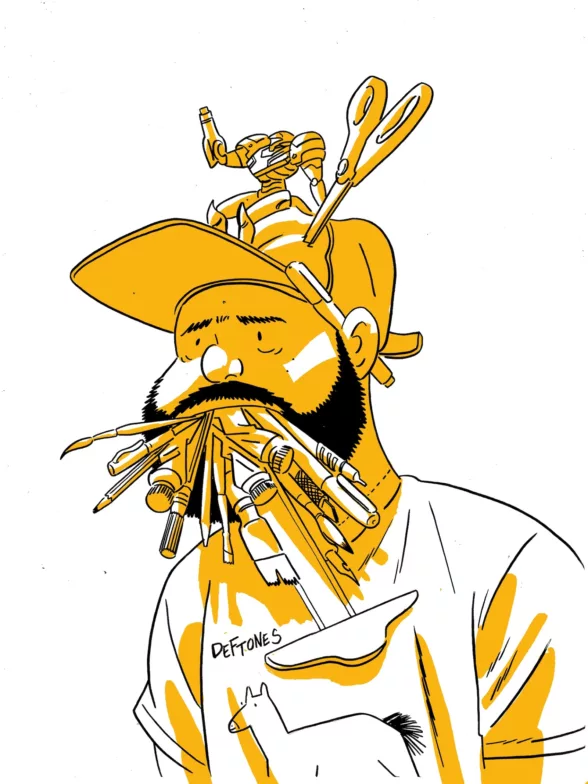
Roberta: So are you unschooled as an artist? You would never know that from your art. It’s very accomplished.
Derick: Thanks. Cool. It’s just a lot of trial and error. And the YouTube has made it pretty easy to learn stuff.
When I got into comics, I think people that had been doing comics for a while generally liked me enough to be real with me and could say, ‘Hey, this sucks. You need to do this better. You need to practice your anatomy. You need to learn how to do perspective.’ And so I’ve always been surrounded by people that are way better than me, and I think that’s the big thing that really helped me get better.
Roberta: You are now passing it on to others. You have these tutorials that you do yourself on YouTube, right? The live streaming of how to draw a comic and how to ink a comic. And you did one of those for the poster that you made recently for Artblog. Passing it along, isn’t it?
Derick: Yeah, I’m trying to. It’s hard because you don’t want to be an influencer. You can go down that road and sound like you know everything, even though you don’t. You become a brand, your own brand. I would like to become a brand, but not an influencer. It’s easy to put the camera on and make the stuff. And then if people have questions…anybody can ask me and I’ll answer it as best as I can.
NOSE BLEED, COVID AND THE NON-BINARY CHARACTER, TILDA
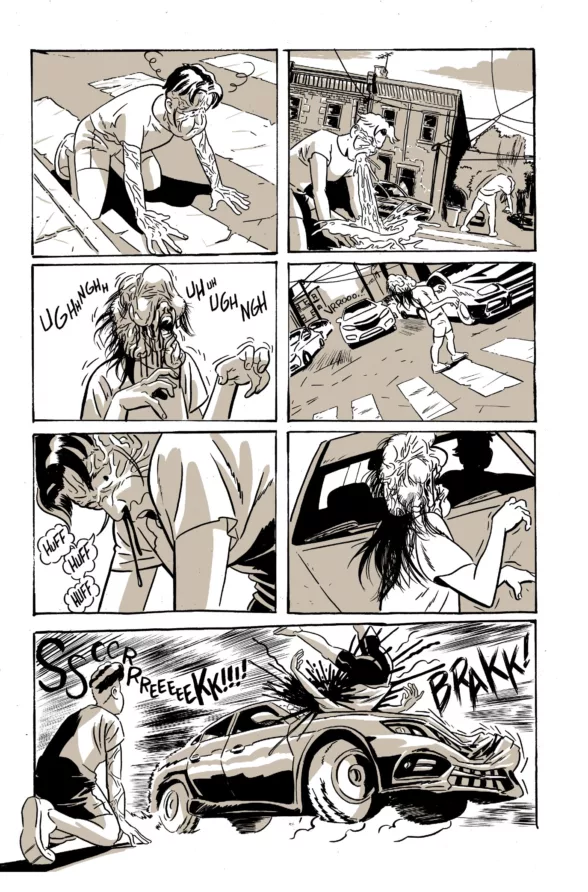
Roberta: Let’s talk about Nose Bleed for a bit. Nose Bleed is on Artblog in its second year now. Where did the story come from? We’ve never talked about that. It’s this amazing story of teenagers…I want to ask if it came out of Covid, because it’s got so many bodily fluids, and the dates sort of coincided with Covid.
Derick: Dunno. Yeah. When you said that, I was like, oh man, maybe it is. I honestly didn’t even put that together. So, Nose Bleed came about as a story that’s always been in my head. I love the psychic telekinetic genre, like what Stephen King and Kamo have done, you know, kids getting psychic abilities and then going nuts and getting revenge on their bullies. I’ve always wanted to play in that playground. I knew I wanted it to be a revenge story, and I knew I wanted it to take place in Philly. And then, putting everything together has just been crazy.
Dealing with bullies and racism, without hammering people on the head with it has been a really big goal with Nose Bleed, and talking about things that people experience without having to be so heavy handed with it, if that makes sense.
Roberta: For sure. And – I may have this wrong – there’s some gender non-conforming positivity too? There’s one character that seems ambiguous in their identity, non-binary. Did I get that right?
Derick: Yeah. Definitely. There’s some empowerment of non-binary people. I mean, you can’t have a story take place in Philly and not have that be a part. That’s such a big part of the community. And you know what’s funny, I didn’t even think of it. When I started drawing Tilda, I gave her one of my favorite haircuts. I had a main character, and if I’m going to get to draw a character, I want them to look as cool as possible. So that’s where that came in. But yeah, I didn’t even honestly think about it. Anybody seeing that person being non-binary? That’s cool. That works. Somebody might take this the wrong way, but I’m a big fan of the non-binary, tomboy look.
Roberta: There’s a very active non-binary community here. The LGBTQ community and William Way Center are big and important. The community is proud and vociferous; there’s a lot of activism for gay rights.
Derick: It’s a good thing. It’d be silly to not have that show up (in the comic).
Roberta: We’re so happy and proud to have Nose Bleed on Artblog! And, you came out with a Nose Bleed print comic book of the first year of Nose Bleed. Where can people get that?
Derick: You can get it @reptilehousecomix.com
Roberta: Everybody! Go get a copy!


